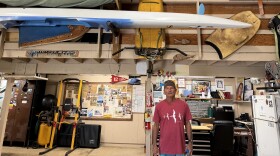HONOLULU — Honolulu’s bikeshare service stopped losing money after tourists returned in large numbers this summer.
Even so, Biki still faces challenges because residents changed their bike riding patterns during the coronavirus pandemic and tourism remains below pre-COVID-19 levels.
“We’re stabilized,” said Bikeshare Hawaii Executive Director Todd Boulanger. “The summer boost in ride revenue basically ended the 12 months of losses. It doesn’t make us whole but we are no longer bleeding."
Last year Bikeshare Hawaii, the nonprofit that manages Biki, experienced a 50% drop in trips due to the pandemic. To deal with losses, it decommissioned seven stations and reduced services.
Bikeshare faces an uphill battle given visitor numbers have waned again after the delta variant fueled a spike in COVID-19 cases. Also, additional bikes and bike parts are a challenge to obtain due to ongoing global supply chain issues.
Demand from residents has declined somewhat, too. Workers who used to drive into town and then ride a Biki to meetings have not returned fully and are not necessarily meeting in person anymore. Also, university crowds have not returned to the same level and are not using Biki at previously top stations, for instance, by Puck’s Alley in Mōʻiliʻili.
Bikeshare also lost one of its business sponsors, All Nippon Airways, a Japanese airline.
Stations in Waikiki, Ala Moana and the Kakaʻako area are still popular, since many residents there still opt to get around by biking instead of driving.
Bikeshare Hawaii manages Biki. Secure Bike Share Hawaii, a for-profit entity, made the initial investment in the bikes and runs day-to-day operations.
Boulanger said Bikeshare will definitely make it to next year. Then it plans to continue discussions with the city and state about Biki’s long-term viability and what kind of financing would be available to keep it going.
The organization said Biki rides diverted over 9.5 million pounds of carbon emissions over the past four years. That’s equivalent of 637,000 gallons of gasoline.
Boulanger said from the beginning, one of Bikeshare Hawaii’s primary objectives was to reduce the community’s dependence on fossil fuels by reducing or eliminating the need to drive for short, frequent trips in town. Offering these alternatives is part of Honolulu’s Climate Action Plan.
More information about Bikeshare Hawaii can be found at GoBiki.org.






